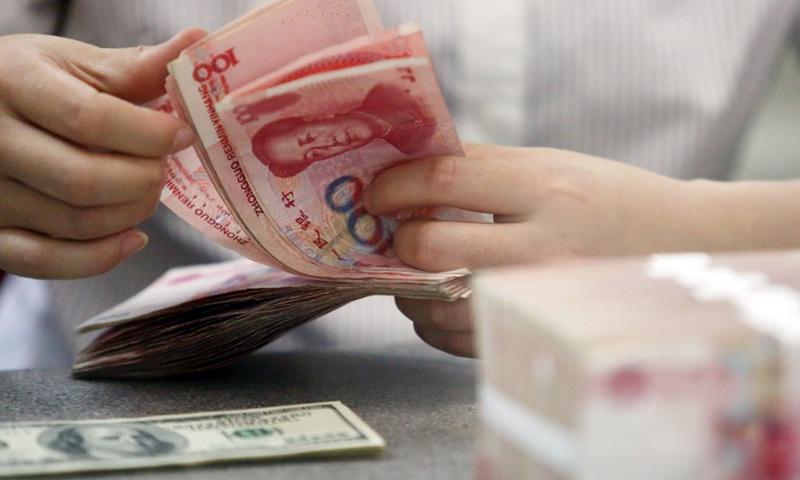
File photo shows a worker counts Chinese currency Renminbi (RMB) at a bank in Linyi, east China's Shandong Province. (Xinhua/Zhang Chunlei)
A total of 10 Chinese commercial banks simultaneously cut deposit interest rates on Monday, following the
Chinese central bank's interest rate cuts announced on July 22. Analysts said the banks' move will lower their funding costs while boosting the flow of funds into the capital market, injecting vitality and consolidating the economic recovery's momentum.
China CITIC Bank cut its demand deposit rate by 5 basis points (bps) to 0.15 percent and the one-year deposit rate by 10 bps to 1.2 percent. Rates on deposits of two years or more were cut by 20 bps, with the five-year deposit rate at 1.7 percent, according to a statement published on the bank's website.
Other commercial banks, including China Everbright Bank Co, Industrial Bank Co and Shanghai Pudong Development Bank Co, announced similar deposit interest rate cuts. Among these banks, China Zheshang Bank Co, Evergrowing Bank Co and China Bohai Bank Co reported the highest five-year deposit rate of 2.1 percent, domestic media outlet caijing.com.cn reported on Monday.
This marks domestic commercial banks' fifth round of deposit rate adjustments since the establishment of a market-oriented deposit rate adjustment mechanism in April 2022. The move, following the Chinese central bank's one-year loan prime rate cut and the trend of other market interest rates, shows that China's deposit interest rate is more liberalized, Wen Bin, chief economist at China Minsheng Bank, told the Global Times on Monday.
China's
six largest state-owned banks announced a reduction in deposit interest rates on Thursday by a maximum of 20 bps, marking the first deposit rate cuts in 2024.
"Commercial banks actively lowering deposit rates, especially medium- and long-term rates, will further reduce their funding costs and improve their profitability in a bid to enhance the sustainability of serving the real economy," Wen said.
In addition, this will encourage market entities to invest more in consumption so as to boost the flow of funds into the capital market and real estate sector for the benign circulation of the economy, Wen said.
The People's Bank of China (PBC), China's central bank, stepped up its use of monetary policy recently. On July 22, the
PBC cut the interest rate on seven-day reverse repos - a widely used liquidity injection tool - by 10 bps, and then on Thursday the PBC lowered the medium-term lending facility interest rate by 20 bps.
The central bank's recent interest rate cuts sent a clear signal of more expansionary monetary policy, indicating policymakers' resolve to bolster the economy, which will help restore social expectations and inject stability into the capital market, Zhou Maohua, an economist at China Everbright Bank, told the Global Times on Monday.
"The move also echoes the just-concluded third plenary session [of the 20th Central Committee of the Communist Party of China], which stressed that the country must remain firmly committed to accomplishing the goals for this year's economic and social development," Zhou said, noting that the third plenum pointed the way for macro policies in the second half of the year.
Since China reported steady 5 percent GDP growth for the first half of 2024, multiple international organizations and banks have maintained their forecasts of 5 percent GDP growth for China this year, thanks to remarkable performances in areas such as exports, even as many major economies and the global economy as a whole face serious downward pressure.




